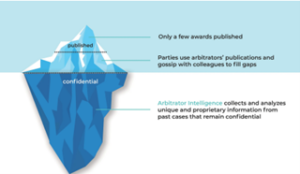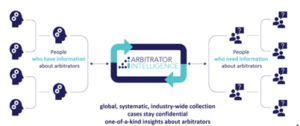This is the final post from Arbitrator Intelligence as an entity. But it is also a call for greater intelligence in arbitrator selection, which is needed now more than ever.
Since the founding of Arbitrator Intelligence, over 10 years ago as an NGO and nearly 5 years ago as a corporate entity, the availability of information about international arbitrators has expanded tremendously. Despite several new resources, however, such information remains partial, fragmented, and not equally available. The most elusive information is paradoxically the most potentially valuable information: details about arbitrators’ actual decisionmaking track records.
Parties frequently cite the ability to select international arbitrators as one of the primary reasons they choose international arbitration. Arguably, the ability to select arbitrators is the single most important strategic decision in the case. After endowing parties with this incredible power, however, we then make them play pin-the-tail-on-the-donkey. Instead of giving them the resources they need to make an informed decision, we effectively blindfold them, spin them around, and wish them good luck in picking the right arbitrator without the information necessary to make an informed decision.
The vast, vast, vast majority of arbitral awards are not published and will never be published, despite the occasional fever dream of widespread publication of redacted awards. Meanwhile, ratings from the various agencies can be helpful, but they offer only vague, abstract endorsements that—let’s face it—all start sounding alike.
Beyond what parties can find through Google searches and feedback from ratings agencies, parties rely on “gossip” collected through the professional grapevine. Personal correspondence with colleagues is often the only way to learn about how arbitrators have decided past cases. Many law firms sell their services based on specialized “insider” knowledge about arbitrators’ past decisionmaking.

Expanded disclosure requirements and stricter conflict of interest rules are putting some limits on how such insider knowledge can be deployed. There are also other problems with private informational advantages and imbalance in arbitrator selection.
Larger firms and big players always have some informational and resource advantages in disputes of any kind. But rarely does that advantage affect who the decisionmaker is. Lopsided advantage in constituting the tribunal has potentially serious consequences for the perceived legitimacy of the process. Having arbitrator selection depend on personal vouching (because objective information is unavailable) also creates obstacles for diversity.

On the other hand, the dramatic expansion in the number of arbitrators means it will be demonstrably more difficult to obtain information about arbitrators’ past decisionmaking. Older generations of arbitrators are aging out and, by definition, younger arbitrators have sat in far fewer cases, making their incidentally published awards even more scarce.
Arbitrator Intelligence sought to solve this problem much the way UBER solved transportation problems. Instead of connecting drivers with riders, however, Arbitrator Intelligence connected parties who had information about arbitrators with people who needed information about arbitrators, all while protecting the confidentiality and anonymity of both sides.

The idea of Arbitrator Intelligence is more urgent today than ever. If you tell people outside of the arbitration community that, in a multi-million or multi-billion dollar case, one of the single most important strategic decisions is made based on scant information and educated guesswork, their chins literally drop in disbelief. And rightly so!
Every other type of big business decision is based on big data analytics and, increasingly, artificial intelligence modeling. Traditional means of data collection are not generally available because of confidentiality in international arbitration. But that does not mean data collection, separate from arbitral awards, is not possible. Arbitrator Intelligence proved that it is possible.
Arbitrator Intelligence never quite outgrew its scrappy start-up status. The ceiling we hit, however, was financial and commercial, not conceptual or technological. Indeed, we demonstrated that key information and data about arbitrators’ case management and track records can be collected, analyzed, and used by parties to improve their strategic decisionmaking in arbitrator selection.
The entire idea of Arbitrator Intelligence was to harness the power arbitration community’s collective intelligence to improve the arbitrator selection process. As an entity, however, Arbitrator Intelligence also harnessed the collective intelligence of its supporters around the world, who brought their creative ideas, their energy, and their tremendous support to Arbitrator Intelligence. They literally brought the idea to life.
To that end, I would like to thank the thousands of people—too many to name here—who supported Arbitrator Intelligence over the years. We were buoyed by hundreds of Ambassador volunteers from around the world. Special, heart-felt appreciation is due to Fahira Brodlija, who became a true partner in the project; to Augusto Garcia, who literally gave blood to support the project; to Amanda Lee, whose endless energy and talent helped us grow; to Greg King, who proves that data analytics can be heroic; and Kiril Gorgievski, who was constant and committed beyond reasonable expectation. Finally, a special thanks to Gwen DeVries, whose no-nonsense approach kept us focused, and to Kluwer, which helped us engage with the market for information in this field.
We also benefitted tremendously from the leadership, guidance, and support of Alan Crain, William Eacho, Penn State Law, Ben Franklin Technology Partners, Invent Penn State, and many many more.
With this post, Arbitrator Intelligence as an entity is ending. But the idea of arbitrator intelligence will live on, hopefully to be reincarnated as a more durable enterprise that can dramatically improve how we select international arbitrators.
Long live arbitrator intelligence!
________________________
To make sure you do not miss out on regular updates from the Kluwer Arbitration Blog, please subscribe here. To submit a proposal for a blog post, please consult our Editorial Guidelines.


